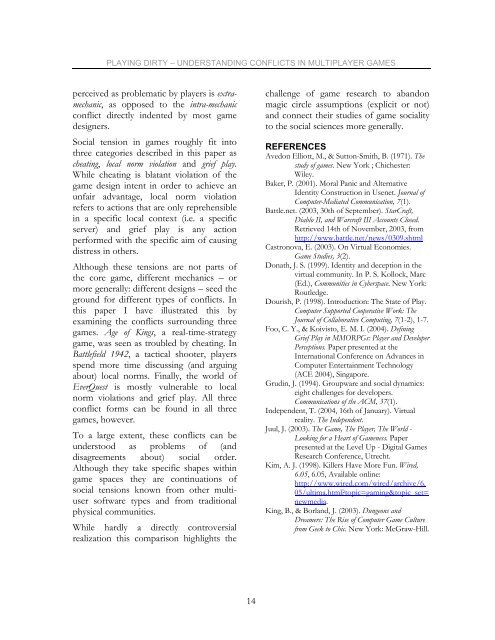Playing Dirty â Understanding Conflicts In Multiplayer Games
Playing Dirty â Understanding Conflicts In Multiplayer Games
Playing Dirty â Understanding Conflicts In Multiplayer Games
You also want an ePaper? Increase the reach of your titles
YUMPU automatically turns print PDFs into web optimized ePapers that Google loves.
PLAYING DIRTY – UNDERSTANDING CONFLICTS IN MULTIPLAYER GAMES<br />
perceived as problematic by players is extramechanic,<br />
as opposed to the intra-mechanic<br />
conflict directly indented by most game<br />
designers.<br />
Social tension in games roughly fit into<br />
three categories described in this paper as<br />
cheating, local norm violation and grief play.<br />
While cheating is blatant violation of the<br />
game design intent in order to achieve an<br />
unfair advantage, local norm violation<br />
refers to actions that are only reprehensible<br />
in a specific local context (i.e. a specific<br />
server) and grief play is any action<br />
performed with the specific aim of causing<br />
distress in others.<br />
Although these tensions are not parts of<br />
the core game, different mechanics – or<br />
more generally: different designs – seed the<br />
ground for different types of conflicts. <strong>In</strong><br />
this paper I have illustrated this by<br />
examining the conflicts surrounding three<br />
games. Age of Kings, a real-time-strategy<br />
game, was seen as troubled by cheating. <strong>In</strong><br />
Battlefield 1942, a tactical shooter, players<br />
spend more time discussing (and arguing<br />
about) local norms. Finally, the world of<br />
EverQuest is mostly vulnerable to local<br />
norm violations and grief play. All three<br />
conflict forms can be found in all three<br />
games, however.<br />
To a large extent, these conflicts can be<br />
understood as problems of (and<br />
disagreements about) social order.<br />
Although they take specific shapes within<br />
game spaces they are continuations of<br />
social tensions known from other multiuser<br />
software types and from traditional<br />
physical communities.<br />
While hardly a directly controversial<br />
realization this comparison highlights the<br />
challenge of game research to abandon<br />
magic circle assumptions (explicit or not)<br />
and connect their studies of game sociality<br />
to the social sciences more generally.<br />
REFERENCES<br />
Avedon Elliott, M., & Sutton-Smith, B. (1971). The<br />
study of games. New York ; Chichester:<br />
Wiley.<br />
Baker, P. (2001). Moral Panic and Alternative<br />
Identity Construction in Usenet. Journal of<br />
Computer-Mediated Communication, 7(1).<br />
Battle.net. (2003, 30th of September). StarCraft,<br />
Diablo II, and Warcraft III Accounts Closed.<br />
Retrieved 14th of November, 2003, from<br />
http://www.battle.net/news/0309.shtml<br />
Castronova, E. (2003). On Virtual Economies.<br />
Game Studies, 3(2).<br />
Donath, J. S. (1999). Identity and deception in the<br />
virtual community. <strong>In</strong> P. S. Kollock, Marc<br />
(Ed.), Communities in Cyberspace. New York:<br />
Routledge.<br />
Dourish, P. (1998). <strong>In</strong>troduction: The State of Play.<br />
Computer Supported Cooperative Work: The<br />
Journal of Collaborative Computing, 7(1-2), 1-7.<br />
Foo, C. Y., & Koivisto, E. M. I. (2004). Defining<br />
Grief Play in MMORPGs: Player and Developer<br />
Perceptions. Paper presented at the<br />
<strong>In</strong>ternational Conference on Advances in<br />
Computer Entertainment Technology<br />
(ACE 2004), Singapore.<br />
Grudin, J. (1994). Groupware and social dynamics:<br />
eight challenges for developers.<br />
Communications of the ACM, 37(1).<br />
<strong>In</strong>dependent, T. (2004, 16th of January). Virtual<br />
reality. The <strong>In</strong>dependent.<br />
Juul, J. (2003). The Game, The Player, The World -<br />
Looking for a Heart of Gameness. Paper<br />
presented at the Level Up - Digital <strong>Games</strong><br />
Research Conference, Utrecht.<br />
Kim, A. J. (1998). Killers Have More Fun. Wired,<br />
6.05, 6.05, Available online:<br />
http://www.wired.com/wired/archive/6.<br />
05/ultima.html?topic=gaming&topic_set=<br />
newmedia.<br />
King, B., & Borland, J. (2003). Dungeons and<br />
Dreamers: The Rise of Computer Game Culture<br />
from Geek to Chic. New York: McGraw-Hill.<br />
14



